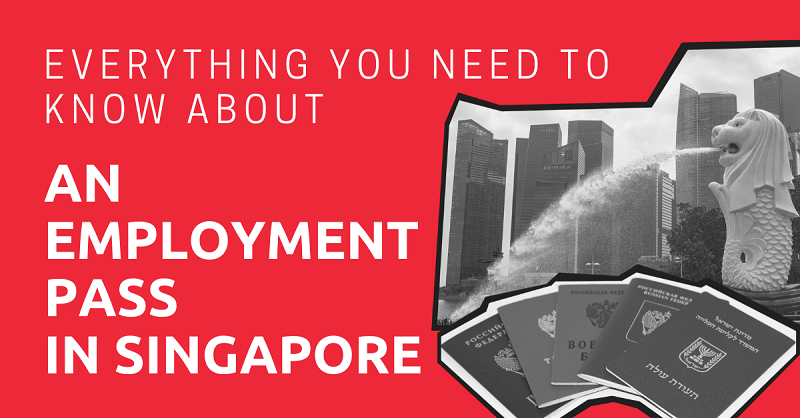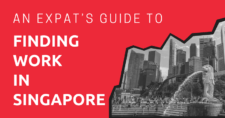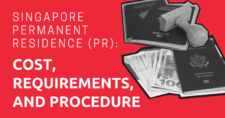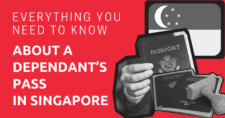
Singapore is one of the most popular places for foreigners to work as it’s safe, has low tax rates, and has plenty of job opportunities.
If you’re considering moving to Singapore for work, you will need an Employment Pass to do so.
This guide offers comprehensive information about Singapore’s Employment Pass to help you decide if you want to get one and move to this unique country. The currency used throughout this guide is Singapore dollars (SGD).
This article will take approximately 12 minutes to read. Don't have the time right now? No worries. You can email the ad-free version of the article to yourself and read it later!
Disclaimer: This article may include links to products or services offered by ExpatDen’s partners, which give us commissions when you click on them. Although this may influence how they appear in the text, we only recommend solutions that we would use in your situation. Read more in our Advertising Disclosure.
Contents
- Key Takeaways
- What is an Employment Pass?
- Is an Employment Pass a Visa or a Work Permit?
- Who’s Eligible for an Employment Pass?
- How to Apply for an Employment Pass
- What Happens If My Employment Pass Application is Rejected?
- Can I Get My Family an Employment Pass?
- Do I Need to Renew My Employment Pass?
- What Happens If I Lose My Employment Pass?
- Can I Switch Employers?
- Can I Work with Another Employer or Get a Freelance Job While I Have an Employment Pass?
- Can I Apply for an Employment Pass While in Singapore?
- Can I Apply for Permanent Residence in Singapore?
- Are There Other Types of Work Passes in Singapore?
Key Takeaways
- An Employment Pass is essentially a work visa in Singapore, allowing you to legally work and live there.
- To obtain an Employment Pass, you must have a job offer from a company in Singapore.
- Once you have a job offer, your employer can apply for the Employment Pass on your behalf.
- An Employment Pass may be valid for one to two years, and your employer can renew it for you.
- If you’re not eligible for an Employment Pass, you may be able to obtain an S Pass, as the eligibility requirements are not as strict.
What is an Employment Pass?
An Employment Pass is a work visa that eligible foreigners can get to work in Singapore. The Ministry of Manpower (MOM) issues the visa and typically reserves it for specialist, executive, and managerial positions.
With an Employment Pass, you can legally live and work in Singapore for one to two years. But you can also travel outside the country and re-enter through a quicker lane without the need for an entry visa.
Having an Employment Pass for one year allows you to apply for a Singapore Permanent Residency as well.
Is an Employment Pass a Visa or a Work Permit?
An Employment Pass is both a visa and a work permit, so it’s commonly known as a work visa. It allows holders to enter and leave Singapore whenever they want, and it allows them to legally live and work in the country as long as the pass is valid.
Who’s Eligible for an Employment Pass?
There are strict eligibility requirements for Employment Passes in Singapore because it’s such a competitive job market with plenty of foreigners wanting to move. Thankfully, there are no nationality requirements for an Employment Pass, so people from any country are eligible.
Here are some of the basic requirements you may need to meet:
- Have a job offer in Singapore
- Work in an executive, managerial, or specialized job
- Earn a fixed monthly salary of $5,000 or $5,500 if you work in the financial services sector
- Have acceptable qualifications, such as a university degree
If you’re not sure whether you’d be eligible for an Employment Pass, you can take the Ministry of Manpower’s self-assessment test. It asks you questions about you and your job, such as your potential salary, citizenship, work experience, and educational background.
At the end, the tool tells you whether you’re eligible for an Employment Pass, S Pass, or no visa at all. It’s just an assessment tool and not a guarantee that you’ll be approved for a visa, but it can give you a better idea about whether or not you should apply for jobs in Singapore.
How to Apply for an Employment Pass
The good thing about an Employment Pass is that you don’t have to apply for it yourself. Instead, your prospective employer does it all for you.
Your employer pays to apply and submits all your documents to show the Ministry of Manpower you’re eligible for an Employment Pass. You just need to send copies of your documents, such as your passport or ID and educational certificates, to your employer.
As the exact requirements you need to meet are subject to change, check with your employer or the Ministry of Manpower’s website to determine what documents to include.

Once your employer submits your application, they should receive a notification of approval or rejection within 10 working days..
If your application is approved, you will receive an in-principle approval letter that includes a pre-approved single-entry visa into Singapore. You must enter the country within six months of receiving the letter.
After entering the country, you and your employer can continue the application process. Your responsibility involves getting a medical examination where the doctor screens you for tuberculosis, HIV, syphilis, and malaria and checks if you’re fit to work. The doctor fills out a medical form you need to submit to the MOM for your Employment Pass.
This allows you to get a temporary notification letter allowing you to work and travel in and out of Singapore. It’s valid for one month. If you need more time to complete the registration process, you can request to extend the validity of the notification letter.
Once you have this letter, your employer can book an appointment for you at the Employment Pass Services Centre. Here, you’ll take a photo for your Employment Pass and register your fingerprints. Don’t forget to bring your passport, appointment letter, and notification letter with you.
After five working days, you should receive your Employment Pass. It’s a small card with your details that you can use as an ID throughout the country.
What Happens If My Employment Pass Application is Rejected?
If your application was rejected, your employer can appeal the decision online within three months of rejection. If your employer misses this time period, they must submit a new application.
Your employer may need to include additional information or documents in your appeal to make your application more attractive. It can take up to six weeks for the Ministry of Manpower to review the appeal.
Can I Get My Family an Employment Pass?
You can’t get an Employment Pass for your family, but you may be able to get them a different visa that allows them to enter Singapore. If you already have an Employment Pass and earn over $6,000 a month, you may be able to bring in the following family members on one of these visas:
- Legally married spouse – Dependant’s Pass
- Unmarried children under 21 – Dependant’s Pass
- Common-law spouse – Long-Term Visit Pass
- Unmarried handicapped children above 21 – Long-Term Visit Pass
- Unmarried step-children under 21 – Long-Term Visit Pass
If you earn over $12,000 a month, you may be able to bring your parents in on a Long Term Visit Pass.
Your employer must submit an application for one of these visas on your family member’s behalf. Click to learn more about the Dependant’s Pass or Long-Term Visit Pass.
Do I Need to Renew My Employment Pass?
As Employment Passes are only valid for one or two years, your employer needs to renew yours for you. They can renew it online up to six months before it expires, so don’t forget to notify your employer about the expiry date.
It’s important to note that renewals aren’t guaranteed, so you may not receive another Employment Pass. If you turned 30 or above while in Singapore, it may be harder to get another Employment Pass unless you receive a raise.
This is because the Ministry of Manpower requires older applicants to receive higher pay for their skills and experience.
If your renewal is approved, you’ll get a new in-principle approval letter that’s valid for three months, allowing you to get a new card. The letter will tell you whether you can continue using your existing card or get a new one.
Renewals are valid for up to three years, so you have a bit more time before you need to renew your Employment Pass again or apply for permanent residency.
What Happens If I Lose My Employment Pass?
If you lose your card or it’s stolen or damaged, your employer must apply for a replacement online within a week. They must pay for the new card, so try to be careful with it. If it was stolen, you also need to file a police report.
The Ministry of Manpower may interview you to discuss how you lost your card or how it was stolen before issuing another one.
Once your employer applies for a replacement, you should receive a letter that will tell you how to pick up your new card at the Employment Pass Services Centre.
Can I Switch Employers?
If you want to apply for a different job while in Singapore, you need a new Employment Pass. Your new employer must apply for the new pass for you.
You don’t need to cancel your current Employment Pass while applying for a new one, but if your new one is approved and you switch careers, your original employer must cancel and dispose of your old pass.
Can I Work with Another Employer or Get a Freelance Job While I Have an Employment Pass?
All work passes in Singapore, such as the Employment Pass and S Pass, are designated to the employer that applied for them. This means that work pass holders can only work for that one employer. They can’t take on any additional work that allows them to earn an income in Singapore, such as freelance work on the side.
Can I Apply for an Employment Pass While in Singapore?
If you entered Singapore on a visit pass, you cannot engage in any business, profession, or paid employment activities. This means you’re not allowed to apply or interview for jobs while you’re in the country.
Some people may ignore this rule, but employment regulations are strict in Singapore, so most employers won’t even talk to tourists on a visit pass.
If you entered Singapore with a Long-Term Visit Pass or Dependant’s Pass, you can apply and interview for jobs. But if you want to work, you must receive a job offer so the employer can apply for a work pass for you.
You cannot keep your Long-Term Visit Pass or Dependant’s Pass if you want to work, so you must cancel it first.
If you entered Singapore with a Student Pass, you can work while you’re in school without getting a work pass. But you’re only able to work a maximum of 16 hours a week while in school. If you have time off, you can work full-time.
Working on a Student Pass typically makes it easier to find employment when you graduate as your current employer may be willing to apply for an Employment Pass or S Pass for you.
Can I Apply for Permanent Residence in Singapore?
If you’ve been working in Singapore on an Employment Pass, you may be interested in staying longer than your pass allows. Although your employer can renew it when it expires, it may not be approved.
Instead, you can apply for permanent residency as having an Employment Pass makes you eligible to apply. You’re able to apply as soon as you get an Employment Pass, but you need to show six months of past salary slips. Applying six months after getting an Employment Pass is more common.
Your application has an even better chance of being approved if you’ve had an Employment Pass for a year or two before applying.
The Immigration and Checkpoints Authority in Singapore handles permanent residency applications. Check out their website for more information about the procedure.
Are There Other Types of Work Passes in Singapore?
There are plenty of different work visas in Singapore other than the Employment Pass, such as the EntrePass or Work Holiday Pass, but the second most common one is an S Pass.
An S Pass is a work visa for mid-skilled technical staff, such as technicians. The eligibility requirements aren’t as strict as employees only need to earn $3,150 a month (or $3,650 to work in financial services) instead of $5,000.
Educational requirements aren’t as strict either as you can have a college diploma or specialized training. You just need one year of full-time study and relevant work experience.






